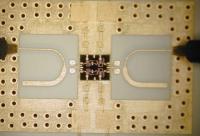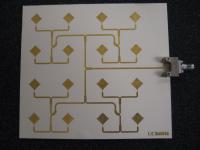Dr. Anh-Vu Pham Named IEEE Fellow for Outstanding Contributions to Organic Packaging for Electronic Circuits
Quick Summary
- Packaging technologies encase electronic circuits to protect them and enable electrical signal distribution for microelectronic chips or components.
- Organic, carbon-containing packages, as opposed to ceramics, allow for cheaper, lighter, and smaller devices.
The Institute of Electrical and Electronics Engineers (IEEE) has recognized UC Davis electrical and computer engineering (ECE) professor Anh-Vu Pham by electing him a Fellow. Being an IEEE Fellow is recognized by the technical community as a prestigious honor and an important career achievement.

Pham was recognized for his extraordinary contribution to organic packaging technologies for electronics. Here, electronic packaging does not refer to the boxes manufacturers use to ship consumer products, but to the physical structures on devices that encase electronic circuits. Using organic carbon-containing materials as opposed to ceramics to package electronic circuits can allow for cheaper, lighter and smaller devices.

Pham hopes to develop organic packaging that will effectively envelop and protect devices operating at microwave and millimeter-wave frequencies. Electronic circuits packaged in this way can be used in wireless communications, radar and instrumentation systems.
Mike Harris, principal research engineer at Georgia Tech Research Institute, highlights the importance of Pham's legacy of technology development.
“Anh-Vu has conducted research in organic packaging technologies for microwave and millimeter-wave frequency applications since his Ph.D. study with the Georgia Electronic Design Center at the Georgia Institute of Technology. He is an international leader in microwave and millimeter-wave organic packaging. His organic packaging work has significant impacts to industry and the IEEE Microwave Theory and Techniques society at large.”

In the 1990s, when the radio frequency electronics industry faced major challenges developing modules to package devices that worked at just a few gigahertz, Pham was already developing and demonstrating organic packages for devices operating in the millimeter-wave frequencies (26.5 to 110 GHz). Today, the industry has products and modules packaged in all-organic materials instead of ceramics, including automotive radar, which operates up to 80 GHz.
In the 2000s, Pham and his students made a number of contributions to the use of liquid crystal polymer (LCP) material for hermetic packaging. Hermetic packaging, which provides an airtight seal, is essential for the reliability of electronics. Pham and his students figured out how to seal a LCP enclosure for protecting electronic circuits and package antennas and integrated passive components.
Pham’s packaging research is internationally recognized. In 2010, he was selected by the IEEE’s Microwave Theory and Techniques Society (MTT-S) to serve as a Distinguished Microwave Lecturer, giving talks to local IEEE chapters on microwave packaging technology.
In 2008, he received the Outstanding Young Engineer Award of the IEEE MTT-S for contributions to the development of microwave and millimeter-wave organic packages, components and modules. He has also been an active member of the IEEE’s Microwave Theory and Techniques Society. Most importantly, Pham has taught and mentored 23 Ph.D. students and 17 M.S. students and has had many undergraduate students performing research in his lab.

